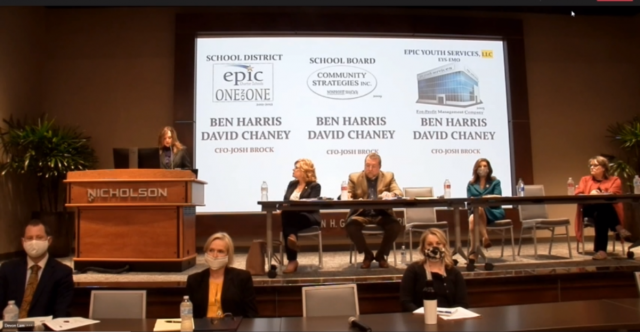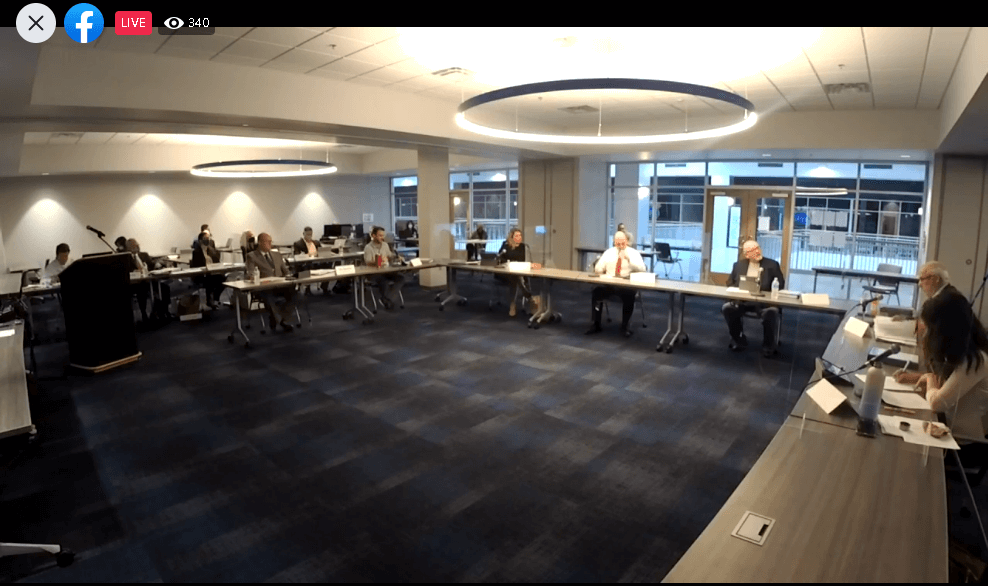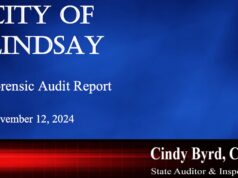
Wednesday was filled with respective meetings of the Rose State College Board of Regents, the House Common Education Committee and Appropriations & Budget Subcommittee for Education, and Community Strategies regarding the investigative audit of Epic Charter Schools.
The Epic audit, which has become a point of political contention in the state, was initially released by the State Auditor & Inspector’s Office on Oct. 1. The document claimed that the charter school owes the state $8.9 million after violating state law limiting the amount of money that can be spent on administrative costs, as well as using Oklahoma tax dollars to fund Epic Charter Schools California. There were also issues of incorrect coding in the Oklahoma Cost Accounting System.
The State Department of Education approved a motion last week to recoup $11.2 million for those expenditures and misuse of state allocated aid. The Statewide Virtual Charter School Board, which is the charter sponsor for Epic One-on-One, also voted last week to begin the process of potentially terminating their contract with Epic owing to violations including a failure to meet contractual standards of fiscal management as well as alleged violations of local, state, federal and tribal law.
State Auditor Cindy Byrd presented the House Common Education Committee with these audit findings during their joint study on Wednesday. Rep. Mark McBride, chairman of the Appropriations and Budget Education Subcommittee, began the meeting by reminding the committee that they are the legislative branch of government, not the judicial branch.
“Our purpose here today is to listen to what the state auditor has to say. As she gives us details of the report, this will help us to determine if there are areas where additional legislation may or may not be needed to protect funding for public education in Oklahoma,” McBride said. “That includes funding of all public education including traditional schools as well as virtual charters.”
McBride (R-Moore) said Epic officials were invited to attend the meeting, but declined, sending a statement instead.
“Several weeks ago, we requested the work papers from the state auditor. Once we receive those, we look forward to providing the committee with a very detailed response to every finding,” Epic’s statement read. “We understand your focus and look forward to submitting details in the near future. It is our hope to have equal time to explain our response. We look forward to working through this together on behalf of the many families we serve. We hope we can do this in an open and transparent way as we feel confident that we can move forward stronger and better for Oklahoma.”
‘In the auditing world, this arrangement is a nightmare’
Byrd referenced the issue of a lack of distinction between Epic Charter Schools, the governing board Community Strategies and the management company Epic Youth Services. Epic co-founders David Chaney and Ben Harris also own and operate Epic Youth Services, with Josh Brock acting as chief financial officer for all three entities.
“When you turn everything over to a for-profit, there’s going to be problems,” Byrd said. “All fiscal, educational and management responsibilities of the school were placed in the hands of a for-profit management company.”
While Epic’s own independent audit claims there was a public nomination process for members of their school board, the investigative audit by the state found no evidence of this process and instead found that members were hand-picked by Harris and Chaney.
“In the auditing world, this arrangement is a nightmare. There are no checks and balances, no internal controls, endless conflicts of interests, inappropriate related party transactions. It’s ripe to misuse taxpayer dollars,” Byrd said.
The audit also revealed that board members did not review transactions and documents such as purchase orders, invoices or bank accounts and that the poor oversight extended to poor attendance. There was not a single meeting in five years with all board members in attendance.
‘There are no findings of any criminal misconduct in this audit’

Community Strategies held their board meetings for Epic One-on-One and Epic Blended on Wednesday to discuss regular business as well the audit findings. Both boards are made up of the same members and have similar agendas, and Wednesday’s meeting ran late into the night.
After more than an hour in executive session, the board approved motion 2020-01 to begin making corrective actions.
This motion included amending the intercompany agreement between One-on-One and Blended for requirement of board approval anytime there is a payment between the schools, amending the operating agreement between schools and Epic Youth Services to require board approval to more specifically set forth how Learning Fund and management fees are calculated, instructing the internal auditor to ensure that invoices are issued and paid in a timely manner and requiring board approval for any other financial transactions.
Any errors that arise must also be reported to the board at the following meeting, and the superintendent or board chair must sign all contracts on behalf of the school.
The board also approved setting a special meeting that will be held Nov. 18.
The Epic Blended meeting followed Epic One-on-One. These motions were also approved after executive session for Epic Blended.
During the meeting, the lawyer for Epic Youth Services, Libby Scott, presented key disputes of the audit from Epic’s 190-page response. Scott said Epic has been cooperative throughout the investigation.
“There are no findings of any criminal misconduct in this audit,” Scott said. “We have combed through this audit report and you will not find one criminal statute that has been violated, you will not find any finance fraud, you will not find any misappropriation.”
Scott’s overview of the audit claims that there were no auditing standards identified. She said the state auditor’s findings of One-on-One inaccurately reclassifying $2,962,975 in administrative costs in OCAS was incorrect and that coding decisions were made according to the OCAS manual. Epic believes they were correct.
Scott also said the finding of One-on-One and Blended reporting Epic Youth Services management fees based on estimate instead of actual cost was also incorrect and that management fees reported have always been the actual amount paid to Epic Youth Services.
“The overarching theme was the auditor really didn’t agree with the interpretations of the law that the school had dealt with all these years and also did not agree with the interpretations of the agencies that govern the school,” Scott said.
During the meeting, Community Strategies also approved a motion to begin holding monthly, rather than quarterly, meetings in 2021 and accepted a resignation from board member Liberty Mitchell.
‘I believe there are areas that your contract has been broken’
The Rose State College Board of Regents also met Wednesday morning, and members listened to a presentation regarding the audit from deputy director of the special investigative unit of the State Auditor & Inspector’s Office, Brenda Holt.
Rose State has been the charter sponsor for Epic Blended since FY2018. As the charter sponsor of Epic Blended, Rose State is responsible for maintaining oversight of operations through annual performance reviews and evaluations and reauthorization of charter applications.
As the charter sponsor, Rose State has retained $3.5 million of state aid sent to Epic by the State Department of Education.
According to the audit, Rose State did not conduct any independent oversight of Epic Blended and instead relied on annual independent financial audits.
“We basically felt like oversight was weak at every level,” Holt said. “There were a lot of reviews and reports done on Epic, done on Blended. But there was little to no communication between the boards and sponsors. There was very little verification of the oversight. It was almost like each organization maybe was passing the buck.”
Holt suggested that the board of regents compare their charter agreement with the audit findings to see if the contract between Rose State and Epic Blended has been broken.
“I believe there are areas that your contract has been broken,” Holt said.
The regents entered executive session to discuss the audit findings, but they took no action. They will meet again Nov. 19 with Epic officials expected to be in attendance.
“Based on due process, we want to give Epic Charter Schools the opportunity to come to our regents meeting in November to respond to some of these investigative results,” Rose State Board of Regents Chairman Brandon Clabes said. “We’re also going to continue to monitor all ongoing investigations to ensure that we know what the final results are before any decisions are made.”






















